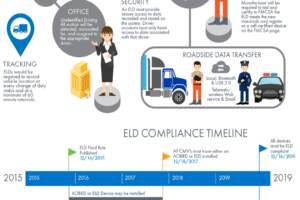All coaching begins with a philosophy, and legendary basketball coach John Wooden’s approach aligns well with the trucking industry’s operational standards. Wooden’s “Pyramid of Success” provides a solid foundation from which driver coaching can begin. While some blocks of the pyramid apply to every organization, such as “industriousness,” other blocks may not initially seem applicable to trucking. This blog will illuminate the value of those non-intuitive foundational blocks as a guide for effective coaching.
Prerequisites
- All coaching relies on data. Wooden’s arena involved college students and basketballs, and his data was in the form of observation, statistics, and team records. Fleet management’s arena involves transportation, and its data is myriad, drawn from specific technology solutions. Without the technology, there is no data to drawn from for successful coaching. Telematics is about fleet optimization, and that includes optimizing driver behavior and skill sets. Make certain your fleet is using a telematics provider that has 24/7/365 live person support or coaching will be useless.
- If a company applies the Wooden approach, it will require the incorporation of introverted values such as empathy, intuition, and encouragement. Wooden broke new coaching ground, developing a method that looked beyond existing cultures. His visionary system proved to be a key factor in elevating UCLA basketball team performance, lifting his predecessor’s 44% winning percentage to 81%; winning an unprecedented 19 conference championships and 10 NCAA championships over his 27 years.
Foundational Block: Loyalty
Wooden says, “Most people wish to be in an organization whose leadership cares about them, provides fairness and respect, dignity and consideration.”
Consider how this statement applies to driver coaching.
The moment a driver enters a coaching session, the fleet or safety manager has an opportunity to establish an environment where there is a mutually desired goal: driver improvement. The driver is more likely to be receptive if the manager avoids leading with criticism and recrimination, but rather creating a dialog with dignity, where the driver’s experience is to be respected, and where reviews of specific incidents will be considered fairly.
The result of a coaching session that regurgitates company-level problems such as accident statistics and impact on insurance premiums, or fixates solely on a 1-800 call, will likely be counterproductive. Respecting the driver’s role and aligning with his personal motivations gains the buy-in you need to foster excellence.
What are the results of a good coaching session? Wooden says, “Loyalty from the top inspires loyalty from below.”
Communicating that coaching is for the benefit of the driver is more likely to result in driver satisfaction and retention than communicating the need for fewer accidents. A driver will be more responsive to reminders of the importance of pre- and post-trip inspections using EVIR if managers illustrate how his own safety and pocketbook benefits as opposed to helping the company keep insurance premiums down.
Foundational Block: Cooperation
Wooden says, “In order to reach your organization’s full potential there must be cooperation. Two strong field horses could not pull an empty baby carriage if they work at cross purposes.”
Fleet and safety managers should clearly communicate that a coaching session is a cooperative event. It is not a unilateral airing of grievances. It is not even a “critique.” Such an approach puts the driver and manager at cross-purposes and runs afoul of another Wooden quote about cooperation: “Have utmost concern for what’s right rather than who’s right.”
Determining what is right removes both the driver’s and manager’s ego from the session. The coaching isn’t about the manager asserting dominance and declaring that his instruction is the right way to do something (even if it is). Instead, the coaching is about something that stands outside of both team members and what they both wish to achieve: the safest possible driving.
Thus, showing the driver telematics data draws him into the spirit of cooperation. The driver can see the same data the manager sees, and his driving improvement will be obvious in the numbers. By removing the abstract and introducing something tangible, the driver will be more responsive and, by definition, cooperative.
Foundational Block: Enthusiasm
Wooden says, “Hard work must be ignited, lit afire by something that will raise it to the extraordinary level required for success. That ‘something’ is your enthusiasm which infuses hard work with inspired power. Your heart must be in your work. Your energy and enthusiasm stimulate those you work with.”
Consider two categories of fleet managers. The first category contains those who naturally and authentically exude enthusiasm and energy. Enthusiasm is infectious. If a driver enters a coaching session and senses that trait in his manager, there’s an opportunity for that driver to leave inspired. If the manager is genuinely pleased about savings via fuel efficiency because of steps the driver took to improve it, based on data he has seen, both individuals are more likely to find additional enthusiasm – especially if there is a reward program involved among the driver workforce.
The second category contains managers who just aren’t authentically enthusiastic or energetic. Not every fleet manager loves his job, and not every day in a fleet manager’s life is perfect. The problem is enthusiasm cannot be faked. Human beings naturally sense inauthentic attitudes and behavior.
For that fleet manager, the previous two foundational blocks take on greater importance. If he establishes an environment of cooperation where the goal is to help the driver to improve, and the driver does so, which in turn generates more loyalty, there’s a much greater chance that authentic enthusiasm will emerge from the manager over time. There are few things that inspire more than helping a team member improve witnessing that growth, and knowing one had a part in that transformation.
Takeaways
Wooden’s Pyramid of Success will be of little benefit to the organization that does not value what Wooden valued. Those that commit will enjoy a return on investment in the form of enhanced stature within the industry, driven by superior driver retention and heightened driver satisfaction, ideally resulting in fewer accidents, lower insurance premiums, reduced fines, and provide a fleet with strong employee reviews for drivers seeking employers that recognize and appreciate their value.







